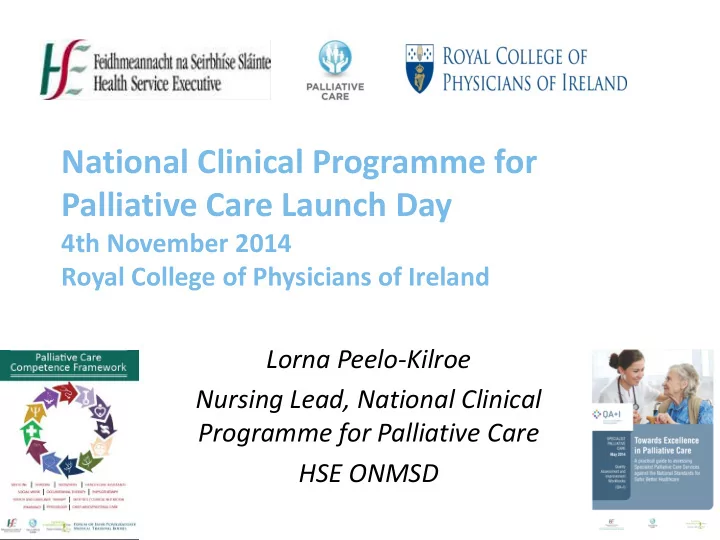

National Clinical Programme for Palliative Care Launch Day 4th November 2014 Royal College of Physicians of Ireland Lorna Peelo-Kilroe Nursing Lead, National Clinical Programme for Palliative Care HSE ONMSD
Being competent Focuses on positively managing uncertainty by blending technical competence with: • Life experience • Wisdom • Intelligence • Knowledge
Competence Concerned with Knowledge + Skill + Attitude Affected by Culture + Workplace + Leadership Addressed using Formal education + Workplace Learning
Knowledge Physical, psychological, social, spiritual Palliative care approach, Impact of stress, shock, palliative care principles grief, loss and and levels of bereavement etc. palliative care provision Meaning of CPD quality of life, Workplace learning life limiting conditions, promoting wellbeing
Skills Open sensitive communication Anticipatory knowledge Care planning, assessing and evaluation, responding collaboration with to symptoms multiple disciplines and choices and agencies Technical knowledge and skills
Attitude questions The impact of workplace culture on service users and staff. Are workplaces person-centred? How a team works together, leaderships, Own and team how they deal with values and beliefs ethical issues, values, about palliative care roles and relationships
Attitude = Culture + 1. Organisational culture : how an organisation operates and present itself and its unique entity e.g. mission, values, structures, processes etc. 2. Workplace culture : ‘how we do things around here’ shaped by patterns of: • How we engage and behave • Our values and beliefs, assumptions, espoused • What care environments feel like to service users • How person-centred the culture is?
What is person-centredness? Definitions and relevance to service • users and staff. • About helpful relationships and treating people as individuals. • Applies to service users and to staff. – Do staff have a right to be treated as individuals too? – How do we promote the psychological wellbeing of staff? www.youtube.com/watch?v=cDDWvj_q-o8
Possible challenges • Effectiveness or not of team. • Inconsistency of care. • Quality of leadership. • How we engage with each other. • Knowledge and experience of staff. • The system we work in unwieldy.
Workplaces Psychologically unsafe: • Unsafe to express opinion and views about practice. • Unsafe to challenge poor practice. • Hierarchal. • Seen as ‘airy fairy’ and unimportant. • Non flourishing. “Without open contexts we can never create the environments that we want”. (Schein, 1988)
Person Centred Culture (Adapted from McCormack & Garbett, 2002)
Infrastructure Support Management Engagemen Support t Skilled Facilitation Resource s
How do we get there? • Start by creating a collective vision for palliative care. • Create conditions where individuals can work together to create, use and share knowledge – psychologically safe workplaces. • Look at transforming practice engaging the whole team – authentic engagement. • Support facilitators, teams and individuals to keep going when it gets tougher. • Need to think differently about one day in-service or change management days when focusing on attitudes.
“The only change that will make a difference is the transformation of the human heart” (Jaworski, 2005)
Recommend
More recommend